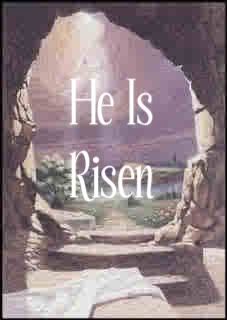|
soul and mind
|
|
|
|
|
|
guitar tunes soothe
|
|
|
|
|
|
time to play
|
|
|
|
|
|
Topic:
Zombie Jesus
|
|

Happy Easter or Resurrection Sunday! 
|
|
|
|
|
|
Topic:
Communicating Faith
Edited by
Laura10
on
Sat 04/11/09 01:43 PM
|
|
|
Amen Michael!
I am so thankful for all the knowledge, revelation, and advice that Paul shared with us! I thought of this verse while reading your post: But thanks be to God, who always leads us in triumphal procession in Christ and through us spreads everywhere the fragrance of the knowledge of him. 1 Corinthians 2:14 and that as we are communicating our faith with one another: Then those that feared the LORD talked with each other, and the Lord listened and heard. A scroll of remembrance was written in his presence concerning those who feared the LORD and honored his name. Malachi 3:16 Isn't that an awesome thought!?! Praise God! Great post, thanks for sharing. 
|
|
|
|
|
|
lovely sentiments MorningSong and lovely pic from you and Laura. Bless you both.  
Thank you Britty. That was an awesome pic with the angel poem PropheticServant.  Blessings Blessings

  
|
|
|
|
|
|
Topic:
You've Never Seen Your Face
|
|
|
You've Never Seen Your Face Seriously, you have never even seen your own face. Sure, you may have seen pictures of yourself. And you can certainly see your face in a mirror. But what you are actually seeing is a reflection, or a representation. The truth is however, that you have never actually seen your face. You have to learn to trust that reflection you see in the mirror. That's who you are in the physical. You know something else? You have never seen your spirit! So how do you know what your spirit looks like? By looking into the spiritual mirror. The perfect law of liberty! James 1:23-25 For if anyone is a hearer of the word and not a doer, he is like a man observing his natural face in a mirror; for he observes himself, goes away, and immediately forgets what kind of man he was. But he who looks into the perfect law of liberty and continues in it, and is not a forgetful hearer but a doer of the work, this one will be blessed in what he does. God's Word is an exact replica of who you are in the Spirit. You have to look into the Word and trust that what you are seeing is a perfect reflection or a mirror-image of your born-again spirit. You are what God's Word says you are! Jesus said: It is the Spirit who gives life; the flesh profits nothing. The words that I speak to you are spirit, and they are life. John 6:63 God's Word is Spirit and it is Life! So, who are you in the spirit today? Who are you in Christ? Today I am just as pure and holy as the Lord Jesus. Today I am blessed beyond measure with every spiritual blessing. Today I am sanctified and made perfect forever! And if Jesus is truly the Lord of your life, so are you. How do I know?The spiritual mirror says so! Herein is our love made perfect, that we may have boldness in the day of judgment: because as he is, so are we in this world. 1 John 4:17 Praise God! Michael Amen! Thanks for sharing Michael 

|
|
|
|
|
|
Topic:
Christians...Rush...Obama...
Edited by
Laura10
on
Wed 04/08/09 08:43 PM
|
|
|
We're a people bound by ideals and a set of values. It depends. If you want to call the Constitution, you know, "ideals and a set of values," then okay, but that is not how I would describe the United States. What "ideals"? Whose ideals are we bound by? If you listen to Obama, the ideals that he espoused on this trip to Europe are not those that are found in the Constitution of the United States. Whose values? When the people of Iowa uniformly reject gay marriage but the Supreme Court of Iowa unanimously says, "Screw you. We're going to make it legal," whose set of values triumph here, the values of a dictatorship (i.e., a court) or the values of the citizens? What are these values that bind us?  
Talk to the people of California when any number of their propositions are overturned by judges on the basis that they're either unconstitutional, or the judge says, "The people don't know what they were doing. They're too stupid." Whose values here bind us? What ideals? If you want to talk about the ideal of the concept of individual liberty and freedom, okay, but that comes from the Constitution. It's why we are an exceptional country. This is one thing Obama wanted to attack. There's nothing exceptional about America. We're no different than you -- and, in the strict sense of DNA, he's right. A human being is a human being, no matter what where the human being is born. We're no better. As human beings, we aren't created superior to anybody else in the world. But what is it? You can't deny the fact that this is the greatest nation on earth. In less than 300 years we have become the most powerful, the richest, the most prosperous, the most generous, the most organized-for-good group of people in the history of the planet. How did this happen? With the same shared ideals and values of Turkey? No! With the same shared and valued ideals of Cuba? No! With the same shared values and ideals of China? Of Russia? Of France? If we shared ideals and values identical to all these other places, we wouldn't be where we are and we wouldn't be who we were. But we are, for a while longer, who we are. We are, for a while, longer what we are. I really believe this from the bottom of my heart. I think it does matter how you grow up. I think it does matter who your mentors are. I think it does matter who your political influences are, and there is no question that Obama's a product of his. As such, he views this nation as too large. It's a nation that deserves to be cut down to size. He views himself as he views much of the people of the rest of the world: discriminated against, stomped on, bullied by the United States of America -- and it's his objective to tell the rest of the world, "Those days are over. We're not going to storm around and steal the world's resources, to pollute and destroy the planet, as we pursue a standard of living that none of the rest of you have and that we deny you." He believes all this. So he's gonna cut us down to size -- and he's doing it in speeches and he's in the process of doing it in his policies. 
Hi Gio 
Thank God there is hope! We can pray for President Obama and for this great nation and trust that things will work out for good. 
|
|
|
|
|
|
Topic:
''Give Praise to the cross''
|
|
|
He came to this earth from heavens shore, Christ, God in the flesh to cleanse us from sin, heal our sicknesses and more. (JOHN 3:16) He paid the price, he became our sacrifice! a bloodied fate, all for me and you,the bible shall state. Praise to the cross, death and hell is not the final end! On the third day he arose up from the grave, to be forever with us an eternal friend! praise to the cross Jesus is alive no more sorrow no more pain as long as in christ your hope remain! (JOHN: 14:6) Amen! Thanks for sharing!   
|
|
|
|
|
|
ok...this is an honest question that i am struggling with. i know what the Bible says about homosexuality and I know how I feel about it. my question is about the country. there is supposed to be separation of church and state. i do agree with this because their are people in the US that aren't Christian and as Christians i believe we showed spread the gospel but not try to force it on others. so this being said....should the government really try to stop it? and as Christians, shouldn't we pray for them and the leaders? The Seperation of Church and State by David Barton In 1947, in the case Everson v. Board of Education, the Supreme Court declared, "The First Amendment has erected a wall between church and state. That wall must be kept high and impregnable. We could not approve the slightest breach." The "separation of church and state" phrase which they invoked, and which has today become so familiar, was taken from an exchange of letters between President Thomas Jefferson and the Baptist Association of Danbury, Connecticut, shortly after Jefferson became President. The election of Jefferson – America's first Anti-Federalist President – elated many Baptists since that denomination, by-and-large, was also strongly Anti-Federalist. This political disposition of the Baptists was understandable, for from the early settlement of Rhode Island in the 1630s to the time of the federal Constitution in the 1780s, the Baptists had often found themselves suffering from the centralization of power. Consequently, now having a President who not only had championed the rights of Baptists in Virginia but who also had advocated clear limits on the centralization of government powers, the Danbury Baptists wrote Jefferson a letter of praise on October 7, 1801, telling him: Among the many millions in America and Europe who rejoice in your election to office, we embrace the first opportunity . . . to express our great satisfaction in your appointment to the Chief Magistracy in the United States. . . . [W]e have reason to believe that America's God has raised you up to fill the Chair of State out of that goodwill which He bears to the millions which you preside over. May God strengthen you for the arduous task which providence and the voice of the people have called you. . . . And may the Lord preserve you safe from every evil and bring you at last to his Heavenly Kingdom through Jesus Christ our Glorious Mediator. [1] However, in that same letter of congratulations, the Baptists also expressed to Jefferson their grave concern over the entire concept of the First Amendment, including of its guarantee for "the free exercise of religion": Our sentiments are uniformly on the side of religious liberty: that religion is at all times and places a matter between God and individuals, that no man ought to suffer in name, person, or effects on account of his religious opinions, [and] that the legitimate power of civil government extends no further than to punish the man who works ill to his neighbor. But sir, our constitution of government is not specific. . . . [T]herefore what religious privileges we enjoy (as a minor part of the State) we enjoy as favors granted, and not as inalienable rights. [2] In short, the inclusion of protection for the "free exercise of religion" in the constitution suggested to the Danbury Baptists that the right of religious expression was government-given (thus alienable) rather than God-given (hence inalienable), and that therefore the government might someday attempt to regulate religious expression. This was a possibility to which they strenuously objected-unless, as they had explained, someone's religious practice caused him to "work ill to his neighbor." Jefferson understood their concern; it was also his own. In fact, he made numerous declarations about the constitutional inability of the federal government to regulate, restrict, or interfere with religious expression. For example: [N]o power over the freedom of religion . . . [is] delegated to the United States by the Constitution. Kentucky Resolution, 1798 [3] In matters of religion, I have considered that its free exercise is placed by the Constitution independent of the powers of the general [federal] government. Second Inaugural Address, 1805 [4] [O]ur excellent Constitution . . . has not placed our religious rights under the power of any public functionary. Letter to the Methodist Episcopal Church, 1808 [5] I consider the government of the United States as interdicted [prohibited] by the Constitution from intermeddling with religious institutions . . . or exercises. Letter to Samuel Millar, 1808 [6] Jefferson believed that the government was to be powerless to interfere with religious expressions for a very simple reason: he had long witnessed the unhealthy tendency of government to encroach upon the free exercise of religion. As he explained to Noah Webster: It had become an universal and almost uncontroverted position in the several States that the purposes of society do not require a surrender of all our rights to our ordinary governors . . . and which experience has nevertheless proved they [the government] will be constantly encroaching on if submitted to them; that there are also certain fences which experience has proved peculiarly efficacious [effective] against wrong and rarely obstructive of right, which yet the governing powers have ever shown a disposition to weaken and remove. Of the first kind, for instance, is freedom of religion. [7] Thomas Jefferson had no intention of allowing the government to limit, restrict, regulate, or interfere with public religious practices. He believed, along with the other Founders, that the First Amendment had been enacted only to prevent the federal establishment of a national denomination – a fact he made clear in a letter to fellow-signer of the Declaration of Independence Benjamin Rush: [T]he clause of the Constitution which, while it secured the freedom of the press, covered also the freedom of religion, had given to the clergy a very favorite hope of obtaining an establishment of a particular form of Christianity through the United States; and as every sect believes its own form the true one, every one perhaps hoped for his own, but especially the Episcopalians and Congregationalists. The returning good sense of our country threatens abortion to their hopes and they believe that any portion of power confided to me will be exerted in opposition to their schemes. And they believe rightly. [8] Jefferson had committed himself as President to pursuing the purpose of the First Amendment: preventing the "establishment of a particular form of Christianity" by the Episcopalians, Congregationalists, or any other denomination. Since this was Jefferson's view concerning religious expression, in his short and polite reply to the Danbury Baptists on January 1, 1802, he assured them that they need not fear; that the free exercise of religion would never be interfered with by the federal government. As he explained: Gentlemen, – The affectionate sentiments of esteem and approbation which you are so good as to express towards me on behalf of the Danbury Baptist Association give me the highest satisfaction. . . . Believing with you that religion is a matter which lies solely between man and his God; that he owes account to none other for his faith or his worship; that the legislative powers of government reach actions only and not opinions, I contemplate with sovereign reverence that act of the whole American people which declared that their legislature should "make no law respecting an establishment of religion or prohibiting the free exercise thereof," thus building a wall of separation between Church and State. Adhering to this expression of the supreme will of the nation in behalf of the rights of conscience, I shall see with sincere satisfaction the progress of those sentiments which tend to restore to man all his natural rights, convinced he has no natural right in opposition to his social duties. I reciprocate your kind prayers for the protection and blessing of the common Father and Creator of man, and tender you for yourselves and your religious association assurances of my high respect and esteem. [9] Jefferson's reference to "natural rights" invoked an important legal phrase which was part of the rhetoric of that day and which reaffirmed his belief that religious liberties were inalienable rights. While the phrase "natural rights" communicated much to people then, to most citizens today those words mean little. By definition, "natural rights" included "that which the Books of the Law and the Gospel do contain." [10] That is, "natural rights" incorporated what God Himself had guaranteed to man in the Scriptures. Thus, when Jefferson assured the Baptists that by following their "natural rights" they would violate no social duty, he was affirming to them that the free exercise of religion was their inalienable God-given right and therefore was protected from federal regulation or interference. So clearly did Jefferson understand the Source of America's inalienable rights that he even doubted whether America could survive if we ever lost that knowledge. He queried: And can the liberties of a nation be thought secure if we have lost the only firm basis, a conviction in the minds of the people that these liberties are the gift of God? That they are not to be violated but with His wrath? [11] Jefferson believed that God, not government, was the Author and Source of our rights and that the government, therefore, was to be prevented from interference with those rights. Very simply, the "fence" of the Webster letter and the "wall" of the Danbury letter were not to limit religious activities in public; rather they were to limit the power of the government to prohibit or interfere with those expressions. Earlier courts long understood Jefferson's intent. In fact, when Jefferson's letter was invoked by the Supreme Court (only twice prior to the 1947 Everson case – the Reynolds v. United States case in 1878), unlike today's Courts which publish only his eight-word separation phrase, that earlier Court published Jefferson's entire letter and then concluded: Coming as this does from an acknowledged leader of the advocates of the measure, it [Jefferson's letter] may be accepted almost as an authoritative declaration of the scope and effect of the Amendment thus secured. Congress was deprived of all legislative power over mere [religious] opinion, but was left free to reach actions which were in violation of social duties or subversive of good order. (emphasis added) [12] That Court then succinctly summarized Jefferson's intent for "separation of church and state": [T]he rightful purposes of civil government are for its officers to interfere when principles break out into overt acts against peace and good order. In th[is] . . . is found the true distinction between what properly belongs to the church and what to the State. [13] With this even the Baptists had agreed; for while wanting to see the government prohibited from interfering with or limiting religious activities, they also had declared it a legitimate function of government "to punish the man who works ill to his neighbor." That Court, therefore, and others (for example, Commonwealth v. Nesbit and Lindenmuller v. The People), identified actions into which – if perpetrated in the name of religion – the government did have legitimate reason to intrude. Those activities included human sacrifice, polygamy, bigamy, concubinage, incest, infanticide, parricide, advocation and promotion of immorality, etc. Such acts, even if perpetrated in the name of religion, would be stopped by the government since, as the Court had explained, they were "subversive of good order" and were "overt acts against peace." However, the government was never to interfere with traditional religious practices outlined in "the Books of the Law and the Gospel" – whether public prayer, the use of the Scriptures, public acknowledgements of God, etc. Therefore, if Jefferson's letter is to be used today, let its context be clearly given – as in previous years. Furthermore, earlier Courts had always viewed Jefferson's Danbury letter for just what it was: a personal, private letter to a specific group. There is probably no other instance in America's history where words spoken by a single individual in a private letter – words clearly divorced from their context – have become the sole authorization for a national policy. Finally, Jefferson's Danbury letter should never be invoked as a stand-alone document. A proper analysis of Jefferson's views must include his numerous other statements on the First Amendment. For example, in addition to his other statements previously noted, Jefferson also declared that the "power to prescribe any religious exercise. . . . must rest with the States" (emphasis added). Nevertheless, the federal courts ignore this succinct declaration and choose rather to misuse his separation phrase to strike down scores of State laws which encourage or facilitate public religious expressions. Such rulings against State laws are a direct violation of the words and intent of the very one from whom the courts claim to derive their policy. One further note should be made about the now infamous "separation" dogma. The Congressional Records from June 7 to September 25, 1789, record the months of discussions and debates of the ninety Founding Fathers who framed the First Amendment. Significantly, not only was Thomas Jefferson not one of those ninety who framed the First Amendment, but also, during those debates not one of those ninety Framers ever mentioned the phrase "separation of church and state." It seems logical that if this had been the intent for the First Amendment – as is so frequently asserted-then at least one of those ninety who framed the Amendment would have mentioned that phrase; none did. In summary, the "separation" phrase so frequently invoked today was rarely mentioned by any of the Founders; and even Jefferson's explanation of his phrase is diametrically opposed to the manner in which courts apply it today. "Separation of church and state" currently means almost exactly the opposite of what it originally meant. -------------------------------------------------------------------------------- Endnotes 1. Letter of October 7, 1801, from Danbury (CT) Baptist Association to Thomas Jefferson, from the Thomas Jefferson Papers Manuscript Division, Library of Congress, Washington, D. C. (Return) 2. Id. (Return) 3. The Jeffersonian Cyclopedia, John P. Foley, editor (New York: Funk & Wagnalls, 1900), p. 977; see also Documents of American History, Henry S. Cummager, editor (NY: Appleton-Century-Crofts, Inc., 1948), p. 179. (Return) 4. Annals of the Congress of the United States (Washington: Gales and Seaton, 1852, Eighth Congress, Second Session, p. 78, March 4, 1805; see also James D. Richardson, A Compilation of the Messages and Papers of the Presidents, 1789-1897 (Published by Authority of Congress, 1899), Vol. I, p. 379, March 4, 1805. (Return) 5. Thomas Jefferson, Writings of Thomas Jefferson, Albert Ellery Bergh, editor (Washington D. C.: The Thomas Jefferson Memorial Association, 1904), Vol. I, p. 379, March 4, 1805. (Return) 6. Thomas Jefferson, Memoir, Correspondence, and Miscellanies, From the Papers of Thomas Jefferson, Thomas Jefferson Randolph, editor (Boston: Gray and Bowen, 1830), Vol. IV, pp. 103-104, to the Rev. Samuel Millar on January 23, 1808. (Return) 7. Jefferson, Writings, Vol. VIII, p. 112-113, to Noah Webster on December 4, 1790. (Return) 8. Jefferson, Writings, Vol. III, p. 441, to Benjamin Rush on September 23, 1800. (Return) 9. Jefferson, Writings, Vol. XVI, pp. 281-282, to the Danbury Baptist Association on January 1, 1802. (Return) 10. Richard Hooker, The Works of Richard Hooker (Oxford: University Press, 1845), Vol. I, p. 207. (Return) 11. Thomas Jefferson, Notes on the State of Virginia (Philadelphia: Matthew Carey, 1794), Query XVIII, p. 237. (Return) 12. Reynolds v. U. S., 98 U. S. 145, 164 (1878). (Return) 13. Reynolds at 163. (Return) http://www.wallbuilders.com/LIBissuesArticles.asp?id=123 |
|
|
|
|
|
Topic:
Christian Meeting Place
Edited by
Laura10
on
Sun 04/05/09 09:23 PM
|
|
 Blessings everyone! Blessings everyone!
Isaiah 60:1 Arise, shine; for thy light is come, and the glory of the LORD is risen upon thee. Love that scripture RT! Psalm 3 (King James Version) 1Lord, how are they increased that trouble me! many are they that rise up against me. 2Many there be which say of my soul, There is no help for him in God. Selah. 3But thou, O LORD, art a shield for me; my glory, and the lifter up of mine head. 4I cried unto the LORD with my voice, and he heard me out of his holy hill. Selah. 5I laid me down and slept; I awaked; for the LORD sustained me. 6I will not be afraid of ten thousands of people, that have set themselves against me round about. 7Arise, O LORD; save me, O my God: for thou hast smitten all mine enemies upon the cheek bone; thou hast broken the teeth of the ungodly. 8Salvation belongeth unto the LORD: thy blessing is upon thy people. Selah. Here is a song by the Brooklyn Tabernacle Choir and the video is awesome! The end is especially powerful! http://www.youtube.com/watch?v=GU8J5l1f5IU&feature=related   
|
|
|
|
|
 Hi MorningSong! Hi MorningSong!
Thank you, that was a blessing. 
|
|
|
|
|
|
Topic:
OK,,,IT 'S THAT TIME
|
|

|
|
|
|
|
|
Topic:
Recall Notice
|
|
  
|
|
|
|
|
|
Topic:
Help Meet
|
|
|
You bring up a good point, Laura. In the opening verse you will notice that God said that it is not good that man should be alone. Then he went on to say that he will make a help meet for him. Before he made man God said after he made stuff he saw that it was good. From just reading Genesis 2:18 I can infer that God loved Adam because he didn't want him to be alone. God actually cared about Adam from my point of view. 
 Sorry RainbowTrout Sorry RainbowTrout
I got a little off topic! 
I agree that God not only cares, but loves us with an everlasting love which is infinately more than we can imagine and always has His best in mind for us! I love to pray the prayer that Paul prayed in Ephesians 3 - that we would be able to grasp how high and wide and long and deep is the love of Christ. This is a revelation that I know that I need to grow in and so I pray this prayer over myself and my children often. Other than the gift of salvation, I believe that a godly marriage where the husband and wife put God first in their lives and love each other the way Christ loves the church would be one of the greatest gifts we can receive. Psalm 128 (NIV) A song of ascents. 1 Blessed are all who fear the LORD, who walk in his ways. 2 You will eat the fruit of your labor; blessings and prosperity will be yours. 3 Your wife will be like a fruitful vine within your house; your sons will be like olive shoots around your table. 4 Thus is the man blessed who fears the LORD. 5 May the LORD bless you from Zion all the days of your life; may you see the prosperity of Jerusalem, 6 and may you live to see your children's children. Peace be upon Israel. 
|
|
|
|
|
|
Topic:
Words from Jesus
Edited by
Laura10
on
Wed 04/01/09 05:42 PM
|
|
|
the Way, the Truth, and the Life Amen!!! Love the Word of God! Matthew 5:10-18 made me think of these verses. Luke 6:27-36 (New International Version) Love for Enemies 27"But I tell you who hear me: Love your enemies, do good to those who hate you, 28bless those who curse you, pray for those who mistreat you. 29If someone strikes you on one cheek, turn to him the other also. If someone takes your cloak, do not stop him from taking your tunic. 30Give to everyone who asks you, and if anyone takes what belongs to you, do not demand it back. 31Do to others as you would have them do to you. 32"If you love those who love you, what credit is that to you? Even 'sinners' love those who love them. 33And if you do good to those who are good to you, what credit is that to you? Even 'sinners' do that. 34And if you lend to those from whom you expect repayment, what credit is that to you? Even 'sinners' lend to 'sinners,' expecting to be repaid in full. 35But love your enemies, do good to them, and lend to them without expecting to get anything back. Then your reward will be great, and you will be sons of the Most High, because he is kind to the ungrateful and wicked. 36Be merciful, just as your Father is merciful. 
|
|
|
|
|
|
Boanerges

I think that is smart and awesome! Thank you for posting positive news! |
|
|
|
|
|
Topic:
Help Meet
|
|

I have been meditating on this subject as well. I am getting use to being alone and plan to use this time to minister to other hurting ladies going through this pain in the church. What the enemy intended for harm, God will turn around and use for good (Gen.50:20). This is a chapter that has helped me a lot during this time. (I love the book of Isaiah, I even named my middle child after him!) Isaiah 54 NIV 1 "Sing, O barren woman, you who never bore a child; burst into song, shout for joy, you who were never in labor; because more are the children of the desolate woman than of her who has a husband," says the LORD. 2 "Enlarge the place of your tent, stretch your tent curtains wide, do not hold back; lengthen your cords, strengthen your stakes. 3 For you will spread out to the right and to the left; your descendants will dispossess nations and settle in their desolate cities. 4 "Do not be afraid; you will not suffer shame. Do not fear disgrace; you will not be humiliated. You will forget the shame of your youth and remember no more the reproach of your widowhood. 5 For your Maker is your husband— the LORD Almighty is his name— the Holy One of Israel is your Redeemer; he is called the God of all the earth. 6 The LORD will call you back as if you were a wife deserted and distressed in spirit— a wife who married young, only to be rejected," says your God. 7 "For a brief moment I abandoned you, but with deep compassion I will bring you back. 8 In a surge of anger I hid my face from you for a moment, but with everlasting kindness I will have compassion on you," says the LORD your Redeemer. He want us to lean, trust in, and rely on Him as He binds our wounds and take care of our needs. He doesn't want us to look to others during this time, but allow Him to refine, prune, purify and heal our broken hearts. Isaiah 62:5b ...as a bridegroom rejoices over his bride, so will your God rejoice over you. God loves each one of us with an everlasting love. He will never leave us nor abandon us. He longs to be gracious to us and rises to show us compassion. His mercies are new every morning. He loves us so much that he numbers every hair on our head and knows when we sit, rise, are in the dark or in the light. He knows our every thought before we speak it and every petition of our heart. God loves you and is rejoicing over you! And I believe that as Michael said, that as we seek God's kingdom and his righteousness and make it our aim and goal to know Him and power of his resurrection and serve Him, He promises to give us the desires of our hearts. Psalm 37:4 (New International Version) 4 Delight yourself in the LORD and he will give you the desires of your heart. So we can wait and trust in Him because He knows what is best for us and He has someone for each one of us if that is a desire of our heart. We just need to be patient and allow Him to work in us and in them and bring us together in His time. His time is always the RIGHT time. I don't want to get ahead or behind Him! Isaiah 40:29-31 (New King James Version) 29 He gives power to the weak, And to those who have no might He increases strength. 30 Even the youths shall faint and be weary, And the young men shall utterly fall, 31 But those who wait on the LORD Shall renew their strength; They shall mount up with wings like eagles, They shall run and not be weary, They shall walk and not faint. Psalm 27:13-14 (Amplified Bible) 13[What, what would have become of me] had I not believed that I would see the Lord's goodness in the land of the living! 14Wait and hope for and expect the Lord; be brave and of good courage and let your heart be stout and enduring. Yes, wait for and hope for and expect the Lord. Blessings! 
  
|
|
|
|
|
|
Topic:
Christian Meeting Place
Edited by
Laura10
on
Thu 03/26/09 01:42 PM
|
|
 LOVING LOVING
Why are you so happy? Why are you so glad? Who has faded all your doubts And cast away your fears? Why are you so radiant? Who drew the glow upon your cheeks? Who brought the peace into your heart And calmed life's blissful blow? Why are you so loving? Who whispered freedom in your ear? Who cast your mountains seaward And who washed away the mire? Why are you so trusting? Why are you so strong? Who gave to you a two-edged sword To keep away all wrong? Why are you so sure? Why are you so free? Because I am loving God, and He is loving me! Poem by Virginia Jack  
|
|
|
|
|
|
Topic:
I Believe
|
|
 
|
|
|
|
|






